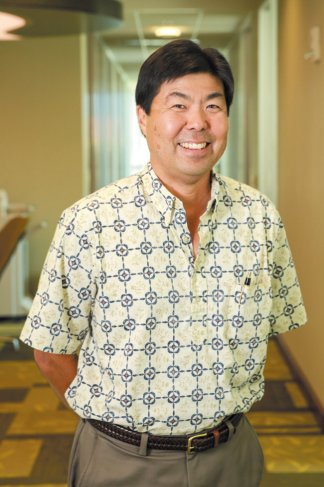Improving Cancer Treatments
Dr. Kenneth Sumida
Associate clinical professor at University of Hawaii Cancer Center
Where did you receive your schooling and training?
I attended University of Hawaii John A. Burns School of Medicine, where I concurrently got my M.D. and a master’s in pharmacology. I then attended Oregon Health and Science University for internal medicine training, followed by hematology and oncology training at Scripps Clinic and Research Foundation.
I am now an associate clinical professor in the Clinical and Translational Research Program at University of Hawaii Cancer Center. I have been the local principal investigator for the National Surgical Adjuvant Breast and Bowel Project, a long-running government-funded group investigating new treatment for breast and colorectal cancer. I am also on faculty at John A. Burns School of Medicine and I am in a group oncology practice.
How long have you been in practice?
I have been practicing oncology in Hawaii for 25 years.
What got you interested in focusing on cancer as a career?
My research interests in college and medical school were in immunology, and this led to an interest in tumor immunology, which I focused on in fellowship.
The field of oncology has been trying to use aspects of the immune system to treat cancers for decades. The practice of oncology appealed to me as I came to learn more about the various cancers and the interesting approaches to treatment, coupled with the emphasis on patient-directed caring, which is what got me interested in medicine to begin with.
What is the goal of your current clinical trials?
To find increasingly successful and less-toxic treatments that lead to higher response rates, longer survivals and better quality of life for cancer patients. UH Cancer Center facilitates the activities of various national research groups and substantially contributes to keeping Hawaii’s cancer care providers, who offer clinical trials for their patients, at the cutting edge. Clinical trials utilize national best-care standards, and patients have the opportunity to benefit from treatment innovations.
Are there a lot of cancer clinical trials in Hawaii?
At least half of the oncologists in Hawaii are active participants with the Cancer Center and participate in clinical trials. UH Cancer Center, working with Hawaii hospitals and physicians, gives Hawaii’s adult and pediatric cancer patients access to about 100 different national clinical trials of new treatments and technologies at any one time. This means that many of Hawaii’s cancer patients do not have to leave the Islands to access the best care and life-saving treatment breakthroughs. Throughout the years that National Surgical Adjuvant Breast and Bowel Project has been running, there have been more than 55 clinical trials in Hawaii seeking to test new therapies for breast and colorectal cancer.
Can you talk about the progress you’ve made thus far in regard to new therapies?
I have participated in trials that have provided patients with new agents and treatment strategies. These national trials have led to higher response rates and better survivals, along with less-toxic therapies by focusing on specific cancer cell properties and the patient as a person. In addition, trials that focus on quality of life have led to various supportive measures that we now commonly use.
How has the look of breast cancer care today changed from what it looked like five or 10 years ago?
We evolved from disfiguring surgery to less-extensive surgery and fewer postoperative debilities through partial mastectomies and limited lymph node sampling. We’ve shortened the duration of chemotherapy treatments and reduced toxicity with improved anti-nausea and other supportive measures. We’ve increased effectiveness by using properties of the immune system to combat cancer cells.
Manipulation of the hormonal system long has been recognized as beneficial, and we’ve seen the development of newer and more effective agents. Most recently, researchers have been able to find unique features of the cancer cell that can be manipulated to our advantage and we are seeing an increasing number of agents that target these unique characteristics.
Anything else you’d like to mention?
UH Cancer Center has provided the physicians of the state of Hawaii with opportunities to gain access to new and cutting-edge drugs and treatment concepts to offer our patients. In addition, opportunities that include seminars at the Cancer Center to learn about cutting-edge drugs and treatments have been a valuable source of education and motivation for local physicians.
These opportunities keep our physicians well-informed and perhaps more engaged with the cutting-edge than would otherwise be the case if we simply delivered medical care without a responsibility to maintain contact with leading research organizations across the country and internationally.






